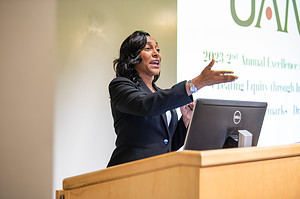View Larger Image

Seven of the Excellence in Mentoring Award recipients pose for a photo after the June 14 ceremony.
Image by Bryan Clifton
Award Ceremony Honors UAMS Faculty, Staff for Excellence in Mentoring
| The University of Arkansas for Medical Sciences (UAMS) presented awards to nine faculty and staff members during a June 14 ceremony that celebrated the service and commitment of mentors throughout the university.
Cam Patterson, M.D., MBA, UAMS chancellor and CEO of UAMS Health, opened the second annual Excellence in Mentoring Awards ceremony with a prerecorded video in which he spoke about the value of mentors and thanked the many employees who serve in those roles.
“Mentors play a significant part in the lives of all of us,” he said. “I’ve had many of them, and I wouldn’t be the same physician or administrator — or even the same person — without their help.”

Tasha Starks, the medical director at St. Bernards Medical Center in Jonesboro, delivers an address about the importance of mentorship.Image by Bryan Clifton
Patterson said anyone can be a mentor if they’re willing to make a concerted effort to share their knowledge and experience for the benefit of others. Mentors play an important role in developing and retaining talented team members and in supporting diversity, equity and inclusion, he said.
The ceremony featured a keynote address from Tasha Starks, M.D., MPH, the medical director at St. Bernards Medical Center in Jonesboro. Billy Thomas, M.D., professor in the College of Medicine’s Department of Pediatrics Division of Neonatology, introduced her to the audience by noting that she embodies many of the qualities that make a good mentor.
“A mentor is someone who is available, who is aware, and who is trusting, caring and very open,” Thomas said.
Starks, a UAMS alumna, focused her remarks on the theme of this year’s event, “Creating Equity Through Inclusive Mentoring.” She spoke of the need for a level playing field in which all people have a support system that provides them with advice, guidance and training.
Starks cited a 2018-19 report from the Association of American Medical Colleges that showed that women comprised 41% of the faculty at academic medical institutions but held only 18% of all department chairs. She also noted issues of representation among minority groups, with Black students making up only 10% of medical school enrollees.
“We’ve made strides, but these numbers suggest we have more work to do,” she said. “We must create a health care system that is diverse, equitable and inclusive, representing all of the people we serve.”
Starks said mentors from all walks of life are needed to help shape the future of health care. She commended the Excellence in Mentoring honorees and encouraged them to think about the mentors who paved the way for them.
“I can assure you that somebody sacrificed for you, too, to help you become leaders in your respective fields,” she said.
Starks also highlighted the power of mentorship in her own life, telling of a moment during her first year as an intern when she felt overwhelmed and ready to quit. On what she believed would be her last day in medicine, a doctor reached out and gave her a talk that has had lasting effects.
“He didn’t look like me; at the time, he didn’t really know me. But none of that mattered,” she said. “Inclusive mentorship is the reason I stand here today as a proud physician.”
The Excellence in Mentoring Awards were presented by Larry Johnson, M.D., director of pulmonary and critical care medicine in the Department of Internal Medicine; Thomas Kelly, M.D., associate director for cancer research training and education at the Winthrop P. Rockefeller Cancer Institute; Gloria Richard-Davis, M.D., MBA, executive director of the Division for Diversity, Equity and Inclusion (DDEI); Richard Turnage, M.D., vice chancellor of UAMS Regional Campuses; and Sharanda Williams, M.A., assistant dean for student affairs and diversity in the College of Medicine.
UAMS received 40 nominations for faculty and staff members who demonstrate a passion for mentorship and for helping others reach their goals. The awards recognize the value of these relationships and the impact they have on professional development and career advancement.
The Excellence in Mentoring Award recipients are:
Women Faculty Excellence Award
Alexandra Marshall, Ph.D., MPH, associate professor, Fay W. Boozman College of Public Health
Diversity Faculty Excellence Award
Wayne Bryant Jr., M.D., assistant professor, Department of Family and Preventive Medicine, College of Medicine
Clinical Emerging Faculty Excellence Award
Lawrence Greiten, M.D., assistant professor, Department of Surgery, Division of Pediatric Cardiovascular Surgery, College of Medicine
Clinical Legend Faculty Excellence Award
William Ventres, M.D., assistant professor, Department of Family and Preventive Medicine, College of Medicine
Research Emerging Faculty Excellence
Jessica Snowden, M.D., vice dean for research, College of Medicine
Research Legend Excellence Faculty
Pearl McElfish, Ph.D., MBA, division director, UAMS Office of Community Health & Research, College of Medicine
Staff Administration Mentoring Excellence Award
Tyrun Haynie, M.A., emergency preparedness director for Institutional Support Services
Staff Education Mentoring Excellence Award
Nicholas Pettus, manager of diverse student recruitment, DDEI
Staff Clinical Mentoring Excellence Award
Gordon Allison, BSN, Med/Neuro ICU
The award ceremony was organized by Williams and Kimberlyn Blann, M.Ed., associate director of admission and outreach programs in the College of Medicine, with support from the UAMS Graduate School, College of Medicine and DDEI.
Richard-Davis provided the ceremony’s closing remarks, focusing on the idea that health equity is achievable when everyone has the opportunity to serve as a mentor or to be mentored.
“Through this collective effort, the sky’s the limit,” she said.
Richard-Davis encouraged anyone who’s interested in being a mentor or mentee to join the Prometheus diversity mentoring platform, a campuswide tool supported by DDEI. The platform offers a searchable database that helps students, residents and faculty and staff members match with mentors whose skills align with their needs.